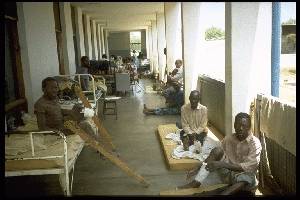|
|
|

|
Malawi Health Care Support UK
|
| Schistosomiasis; Bilharziasis | |

Hospital in Malawi |
Schistosomiasis, (a.k.a. Bilharziasis), is common in Africa and Asia.
It is caused by blood flukes, (flatworms).
Two types of this disease are common to Africa.
Mason's schistosomiasis is caused by intestinal blood flukes, Schistosoma mansoni. These live in the veins surrounding the intestines, and pass eggs out through faeces. They infect humans by absorption through the skin, (i.e. touch). Vesical schistosomiasis is caused by urinary blood flukes, Schistosoma haematobium. These are similar but eggs escape the body in urine by breaking through vein walls into the bladder. Female flukes lay between 300 and 5,000 eggs daily into the bloodstream. These find their way to the bladder or intestine, and are excreted from the body. On contact with fresh water, they hatch and swim about to find an appropriate host, (usually a snail). There they develop further then leave as larvae. On contact with mammals, they enter the skin shedding their tail, and find their way to the blood stream. Here they feed and the process is repeated. The disease can be caught swimming in waters populated by schistosome carrying snails. It can also be caught by contact with improperly treated water, so is common in rural areas. |
Treatment is usually by chemotherapy. This is aimed at killing the adult flukes producing the eggs. Untreated the flukes have life spans of up to 25 years.
Behind malaria, it is the next most serious parasitic infection for humans. The World Health Organisation, (WHO), believe there are around 200 million people infected worldwide. (This includes a 3rd type of schistosomiasis mainly found in the far-east.)